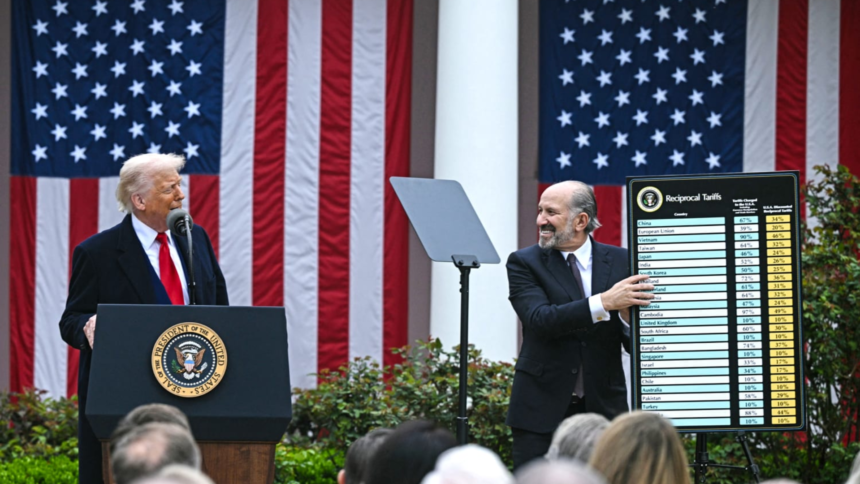A New Wave of Tariff Hikes Shakes Global Trade
The United States trade policies have once again captured international attention as former President Donald Trump announced a dramatic escalation in tariffs. In a bold move, Trump doubled the tariffs on steel and aluminum imports to 50%, citing the need to protect American industries from what he called “unfair foreign practices.”
“This is about reclaiming our economic sovereignty,” Trump declared during a rally in Ohio. “No more will we allow other countries to dump cheap metal into our markets and destroy American jobs.”
The tariff hike comes at a time of rising global trade tensions. Several U.S. trading partners, including the European Union, Canada, and South Korea, have criticized the decision, calling it a breach of fair trade practices.
Economic Concerns and Industry Reactions
While the former president’s supporters argue the move strengthens U.S. manufacturing, critics warn it may backfire. Higher import costs could drive up prices for American manufacturers who rely on foreign steel and aluminum, ultimately hurting the very industries the tariffs aim to protect.
“The policy may help a few domestic producers, but it risks destabilizing supply chains across several sectors,” said Dr. Alicia Bowman, a trade economist at Georgetown University. “We’ve seen this play out before. Short-term wins, long-term damage.”
The U.S. Chamber of Commerce issued a statement urging reconsideration:
“While we support strong trade enforcement, doubling tariffs risks retaliatory measures and reduced global competitiveness for U.S. businesses.”
Elon Musk Slams New Tax and Spending Bill
Adding fuel to the fire, tech billionaire Elon Musk delivered a scathing critique of a new federal tax and spending package. The bill, which includes substantial investments in green energy, infrastructure, and welfare programs, has come under fire from fiscal conservatives.
Musk didn’t hold back.
“This bill is a disgusting abomination. It adds $2.5 trillion to the deficit with no accountability. Washington is addicted to reckless spending,” he tweeted on Monday.
The Tesla and SpaceX CEO’s comments sparked heated debate online. Supporters praised his honesty, while critics argued Musk was defending his own financial interests, particularly as the bill includes new corporate tax provisions that could impact tech giants.
Stefanik Launches PAC Amid Republican Repositioning
In parallel with the economic drama, internal political movements are reshaping the Republican Party. Representative Elise Stefanik, a prominent conservative figure, launched a new Political Action Committee (PAC) aimed at bolstering Republican fundraising in New York.
The PAC, named Empire Values PAC, is being interpreted by many analysts as a strategic move toward a potential 2026 gubernatorial bid.
“We need to bring real conservative leadership to New York,” Stefanik said during her press conference in Albany. “This PAC will support candidates who share our vision for liberty, economic growth, and safe communities.”
Political experts view Stefanik’s rising profile as part of the GOP’s broader effort to challenge entrenched Democratic leadership in traditionally blue states.
A Divided Nation Reacts
The reactions across the United States to these developments reveal deepening divides.
In rust belt states like Pennsylvania and Michigan, many working-class voters praised the tariff move as a long-overdue correction to globalization. Meanwhile, in coastal states and tech hubs, business leaders expressed concern about increased costs and diplomatic fallout.
According to a CBS News/YouGov poll released on June 4, 2025:
- 52% of Republican voters support the tariff hikes
- 61% of Democrats believe the tariffs will hurt U.S. competitiveness
- 48% of independents are undecided, reflecting widespread uncertainty
Social media platforms were flooded with contrasting hashtags like #ProtectAmericanJobs and #TariffDisaster, underlining the sharp polarization.
International Blowback and Retaliation Risks
Beyond U.S. borders, global leaders issued swift responses. EU Trade Commissioner Karin Jansen warned that the European Union may consider countermeasures.
“These tariffs are unjustified under WTO rules. The EU will defend its industries and workers,” she stated.
Canada’s Foreign Minister also expressed concern, noting that these measures could impact ongoing trilateral cooperation under the USMCA agreement. Similarly, South Korea called for emergency talks to avoid economic escalation.
Economic Outlook: Uncertainty Ahead
Economists warn that these combined developments—tariff hikes, deficit concerns, and political infighting—could lead to economic instability if not managed carefully.
“The U.S. needs clarity and cohesion in its trade and fiscal policies,” said Janet Paulson, senior analyst at Goldman Sachs. “Markets hate uncertainty, and that’s what we’re facing now.”
Wall Street reflected that concern, with the Dow Jones Industrial Average dropping 1.6% the day after Trump’s tariff announcement.
What’s Next for the United States Trade Policies?
With a heated election season approaching, trade and economic policy will be central themes. Donald Trump’s re-emergence on the trade stage suggests a return to more protectionist policies if he seeks and wins another term.Meanwhile, the Biden administration remains largely quiet, reportedly preparing a diplomatic response to mitigate international backlash without directly antagonizing Trump’s voter base.
On the other hand, political figures like Stefanik are carving out new power bases, possibly aiming to influence future economic directions within the Republican party.
Conclusion: Balancing National Interest with Global Stability
The current wave of United States trade policies and internal political shifts underscores a deeper ideological struggle—between nationalism and globalization, populism and technocracy, austerity and investment.As leaders and voters alike grapple with these challenges, the future of American economic leadership remains uncertain. What is clear, however, is that the path forward will be shaped not just by policies, but by the fierce political dynamics behind them.
Whether these moves lead to a stronger economy or greater division will depend on the choices made in the coming months—by voters, policymakers, and stakeholders at every level.




